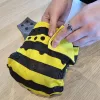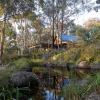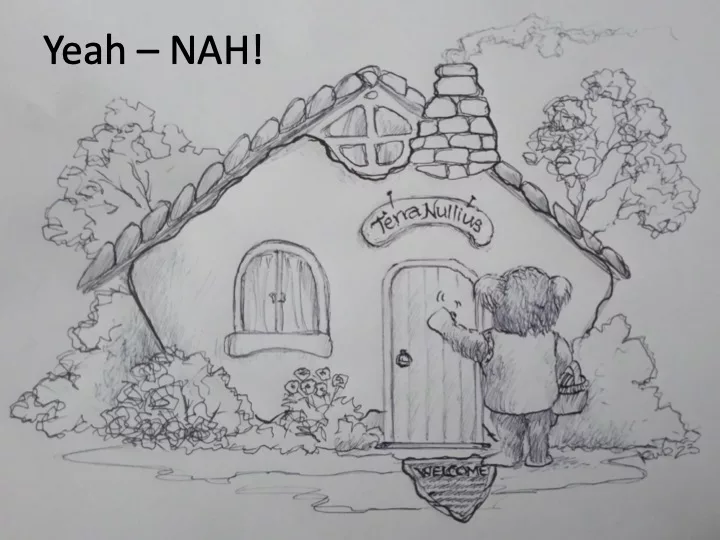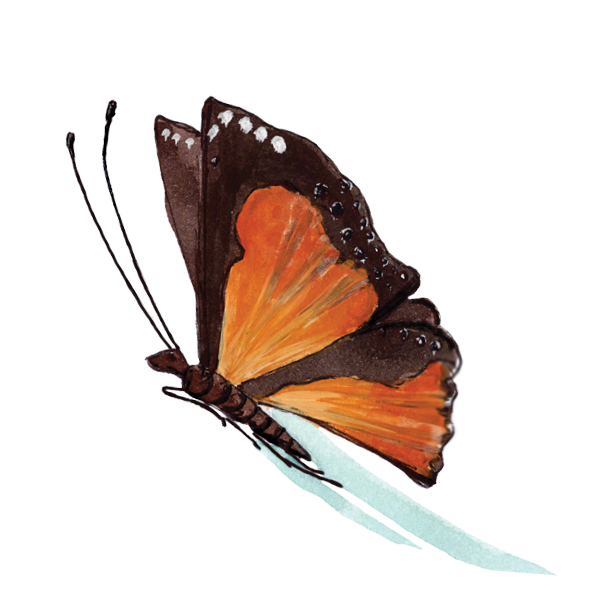Once a year, in Spring, winged termites, known as alates, emerge from their colonies and swarm to mate. In Eltham, where we live, this typically happens on a warm mid Spring evening after recent rains; an evening that would otherwise fill our hearts with the joy of upcoming warm weather, the anticipation of balmy summer nights, and a general sense of lightness.
In Eltham and our surrounding suburbs this event isn’t just a minor occurrence, it’s a spectacle that’s hard to ignore. Step outside on an evening when the swarm is underway and you’ll be surrounded by flittering winged creatures. They’re harmless to us, as they swarm, and – if you’re not turned off by the “insectiness” of it all – it’s almost enchanting.
Termites aren’t bad. If they get into your house framing you won’t be very happy. But in general they’re an important part of any natural environment – decomposing and disposing of dead wood, returning those nutrients to the life cycle, providing a wonderful feast for our local birds and microbats, and clearing space for new generations of trees and plants.
Their appearance around Eltham last week had a curious timing – it coincided with the week following the national referendum on a Voice to Parliament. This proposal aimed to give Aboriginal and Torres Strait Islanders recognition and a permanent voice. And it happened when I was in a morosely ponderous mood, weighed down by thoughts and emotions.
A group of other campaign facilitators from the Jagajaga for Yes group and I gathered for dinner and an evening together at a house in Montmorency.
We met to consider what had happened, spend some time with each other without the pressures of campaigning, and to think about what we should do next. Over the previous months we had been busy organising. There was doorknocking, street events, station flyer handouts, community forums, phone banking, letterboxing, the huge work involved in staffing polling booths on referendum day and a ream of other activities. It had felt like riding a wave which crescendoed into a tsunami of activity, finally crashing ashore on referendum day.
We sat and ate outdoors, exhausted but enjoying the warm balmy evening, surrounded – as it turned out – by the swarming insects. For us it’s an annual event – a local marker of the beginning of summer. Some of our group live further south, in Ivanhoe and Heidelberg. They were amazed at the swarms, and we, from the north, were surprised that they didn’t know of them.
This evening of reflection, contemplation and regrouping prompted an awareness that we live in a continent that is huge and varied. A reminder that even within short distances our local environments can have strikingly different characteristics and behaviours.
In our local suburbs like Eltham and Montmorency, and slightly further afield in places like Ivanhoe, Rosanna, Macleod, Viewbank and Yallambie the number of people who voted “Yes” to change our constitution was well in the 60% range. In other parts of the electorate it was less convincing and in a few parts there were more “No” votes. Overall Jagajaga voted 55% for a change. Nationally, as you’d know the results varied from suburb to suburb, town to town and state to state. Overall only 40% wanting change and 60% preferring the way things already are.
The evening reflections and termite swarm also reminded me that there are cycles in life; creation and destruction. That even the spring, which we generally perceive as a time when life forces and creation is abundant, is a time when the countervailing forces of deconstruction and decomposition also play their part.
Since I was feeling reflective, this moment felt significant. As we sat there, enveloped by the swarm of alates, I began weaving together the various threads of our experiences; from the intricacies of the local ecology, to the broad strokes of the Australian political landscape. The surprise of our southern friends at the termite swarm became a metaphor for how easy it is to be insular in our viewpoints, to be unaware of what’s happening just a few kilometres away. Just as we were surprised by their unfamiliarity with the annual termite swarms, so too we might be surprised by what others don’t know or understand about issues that are close to our own hearts.
The annual cycles of nature intermix construction with destruction, creation with decomposition. One feeds and informs the other. Australian political history is rich with creative initiatives and groundbreaking ideas, but also with dead wood – outdated ideologies, entrenched systems of inequality and disadvantage – which need to be deconstructed so we can build something new from it.
Sometimes the first step in building new and better things is to identify where the old wood is; whether it be in our backyards, or in society as a whole. Only then can we start to pull it apart and feed the growth of something healthy and new. Much like a natural ecosystem, where even small organisms like termites play a crucial role over time, our efforts as a community can start small but grow to make lasting changes. It might take time to see the fruits of our labour, but each small step contributes to positive change.





